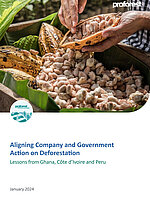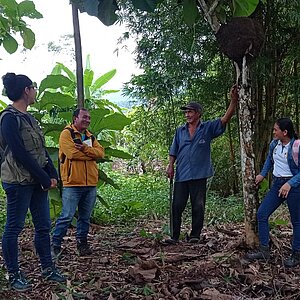Deforestation-free supply chains in Cote d’Ivoire

San-Pédro has now been selected as the pilot landscape for the IKI funded landscape programme.
San-Pédro has now been selected out of three regions as the pilot landscape for the IKI funded landscape programme to align international deforestation commitments with local and national climate mitigation initiatives.
Selecting the landscape in which to work had to be a local, collective and collaborative decision. The organisation Proforest therefore facilitated a workshop attended by government representatives, companies and civil society organisations to review three potential landscapes for the programme.
Proforest is working in Cote D’Ivoire, as one of the three focal countries of its landscape programme funded by the IKI. The programme includes the development and testing of landscape and jurisdictional approaches and guidance, as well as capacity building among local and national stakeholders.
The decision for the region of San-Pédro
The city of San-Pédro grew rapidly around its port, the second largest after Abidjan port, exporting the majority of forestry products from the country.
With a population of almost a million people across the city and many villages, the region of San-Pédro encompasses agricultural land as well as primary forest. The stakeholders also recognised that it would benefit from investment in capacity building, as a region that has had less resources to establish landscape governance and best practice.
Collaborative decision making
Proforest works to ensure that all of the activity is built on collaboration, bringing together government, private sector, NGOs, civil society and local and indigenous communities, including the many smallholder farmers who work in the landscape.
The IKI funded landscape programme in San-Pédro aims to demonstrate a successful pilot for responsible sourcing and production which allows for local economic prosperity and locally-owned decision making, whilst building capacity of farmers to maximise existing land instead of potential encroachment into natural forest.
Background information: The Cote D’Ivoire Context
Drivers of deforestation in Cote d’Ivoire as a whole are varied, but agriculture is by far the largest at 62 percent with crops such as cocoa, rubber, palm oil and cashew the leading causes. Non-agricultural deforestation in the country is also caused by logging (18 percent), infrastructure (10 percent) and mining (8 percent). In terms of the international market for cocoa alone, Cote d’Ivoire is a major player – producing around 40 percent of global cocoa, so focusing on the sustainability of this one country’s supply has the potential to have enormous impact in terms of global markets.
The link has been copied to the clipboard
Contact
IKI Office
Zukunft – Umwelt – Gesellschaft (ZUG) gGmbH
Stresemannstraße 69-71
10963 Berlin












